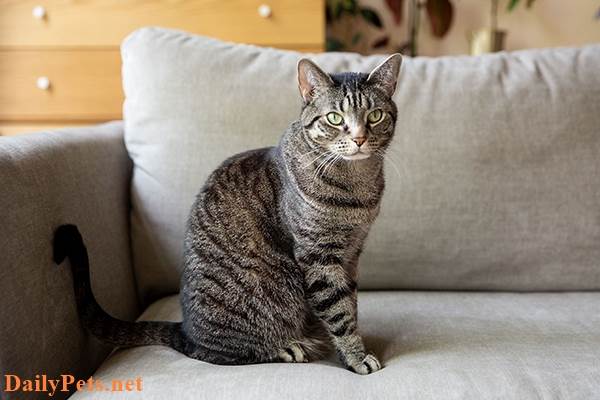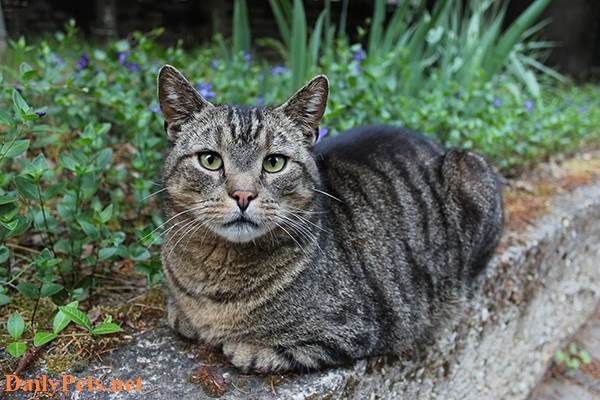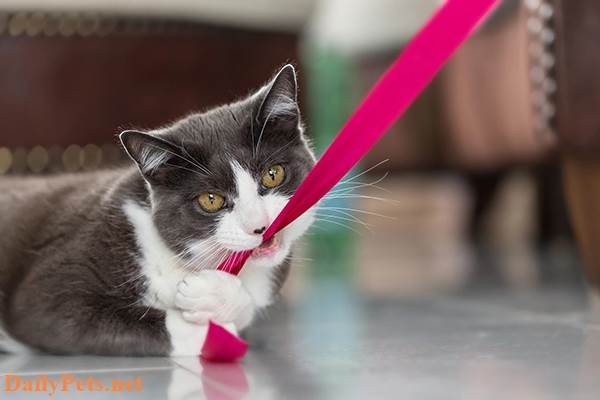A Domestic Shorthair cat, often abbreviated as DSH, is not a specific cat breed but a term for cats of mixed or unknown ancestry with short hair.
These cats come in various colors, patterns, and coat lengths, but they all share the common trait of having a short, dense coat.
Domestic Shorthair Cat origin
The Domestic Shorthair cat, often abbreviated as DSH, is not a specific breed with a defined origin like some purebred cat breeds. Instead, it is a term used to describe cats with short coats that don’t belong to a recognized purebred breed. Domestic Shorthairs are often mixed-breed cats with a variety of genetic backgrounds.

Domestic Shorthair cats have been around for centuries and can be found in many parts of the world. Their origins are diverse and can be traced back to various regions and periods. They result from natural selection and adaptation to their environments over generations.
Physical characteristics of Domestic Shorthair cat
The physical characteristics of Domestic Shorthair (DSH) cats can vary widely because they are not a specific breed but a category that includes mixed-breed cats with short coats. However, there are some common physical traits and characteristics that you might find in DSH cats:
- Coat: As the name suggests, DSH cats have short coats that are dense and sleek. The coat can come in a wide range of colors and patterns, including solid colors, bi-color, calico, tabby, and more.
- Size: DSH cats can come in various sizes but are typically medium-sized, with a balanced body structure.
- Head: They have moderately sized heads with a typical cat face shape. Their ears are usually of medium size and alert.
- Eyes: The eye color can vary but is often green, amber, or yellow. The shape of the eyes is typically almond-shaped.
- Tail: DSH cats have long, graceful tails that taper to a point. The tail can be straight or slightly curved.
- Body: Their bodies are generally muscular and well-proportioned. They are agile and graceful in their movements.
- Whiskers: Whiskers are on the cheeks, above the eyes, and around the mouth. They are used for sensing their surroundings.
- Paws: DSH cats have four paws with retractable claws, which they use for grooming, climbing, and hunting.
- Nose and Mouth: The nose and mouth are of moderate size and can vary depending on the cat’s coat color.
Domestic Shorthair Cat Personality Traits
Domestic Shorthair (DSH) cats are known for their diverse and friendly personalities. They easily adapt to different living situations and often form deep, affectionate bonds with their human friends.
These cats have a playful spirit, loving interactive toys and exploring their surroundings with curiosity. They’re also pretty intelligent, quick learners who enjoy puzzles and games. While they enjoy human company and are usually sociable, they also have an independent side and can keep themselves entertained.

Many DSH cats get along with other pets, have low grooming needs, and may show off their hunting skills during play. Some are chatty and love a good conversation, while others prefer to be silent observers.
Whether they become snuggly lap cats or content companions nearby, Domestic Shorthair cats each bring their unique personality, adding a touch of charm and companionship to your life.
How to take care of Domestic Shorthair cats
Caring for a Domestic Shorthair (DSH) cat involves several key aspects, including nutrition, hair care, and managing common health concerns. Here’s a guide on how to care for your DSH cat:
Nutrition
- Balanced Diet: Provide your DSH cat with a balanced and nutritious diet. High-quality commercial cat food that meets their life stage and dietary requirements is a good choice.
- Portion Control: Monitor your cat’s food intake and follow feeding guidelines to prevent overfeeding or obesity.
- Fresh Water: Ensure access to clean, fresh water at all times.
- Consult a Vet: Talk to your veterinarian about your cat’s specific dietary needs, especially if they have any health conditions or dietary restrictions.
Hair Care
- Regular Grooming: Despite their short coats, DSH cats benefit from regular grooming. Brushing helps remove loose hair, reduces shedding, and prevents matting.
- Bathing: DSH cats typically do not require frequent baths unless they get into something messy. If you do bathe them, use a cat-specific shampoo and be gentle.
- Nail Trimming: Trim your cat’s nails as needed to prevent them from becoming too long and causing discomfort or damage.
Common Diseases and Health Care
- Regular Vet Visits: Schedule annual check-ups with a veterinarian to monitor your cat’s overall health and address potential issues early.
- Vaccinations: Keep your cat updated on vaccinations to protect against common feline diseases like rabies, distemper, and feline leukemia.
- Parasite Control: Administer regular flea, tick, and internal parasite treatments as your vet recommends.
- Dental Care: Dental health is crucial. Brush your cat’s teeth regularly and provide dental treats or toys to help prevent dental problems.
- Spaying/Neutering: If your DSH cat isn’t already spayed or neutered, consider doing so to prevent unwanted pregnancies and certain health issues.
- Common Diseases: DSH cats can be prone to common feline health issues such as urinary tract problems, kidney disease, dental disease, and obesity. Be vigilant for signs of illness and consult your vet if you notice any concerning symptoms.
- Microchipping: Consider microchipping your cat for identification in case it gets lost.
Exercise
Domestic Shorthair cats need mental and physical stimulation. Provide toys, scratching posts, and interactive play sessions to keep them active and engaged.

Create a safe outdoor space or use a leash and harness for supervised outdoor time if your cat enjoys it.
Love and Attention
Domestic Shorthair cats thrive on companionship and affection. Spend quality time with your cat, petting, cuddling, and talking to them.
Following these guidelines and providing your DSH cat with proper care can ensure they lead a happy, healthy, and fulfilling life. Regular vet visits and proactive health management are essential to catch and address any health issues early.
Domestic Shorthair cat lifespan
The lifespan of a Domestic Shorthair (DSH) cat can vary depending on various factors, including genetics, diet, healthcare, and living conditions. On average, DSH cats typically live to be around 15 to 20 years old, but some can live even longer with proper care.
It’s important to note that DSH cats, being mixed-breed cats, often benefit from genetic diversity, which can contribute to their overall health and longevity. However, they are still susceptible to common feline health issues, and regular veterinary check-ups, a balanced diet, a safe and stimulating environment, and attention to their well-being are essential in helping them lead long and healthy lives.
Remember that individual cats may have variations in lifespan, and some may live shorter or longer lives based on their specific genetics and health circumstances.
Domestic Shorthair cat price
The price of a Domestic Shorthair (DSH) cat can vary widely depending on several factors:
Adoption from a Shelter or Rescue
Many DSH cats are available for adoption from animal shelters and rescue organizations. The adoption fee typically covers vaccinations, spaying or neutering, and sometimes microchipping and basic medical care. Depending on the shelter and location, adoption fees can range from $50 to $150.
Breeders
While DSH cats are not typically bred as purebred cats are, some breeders may occasionally have mixed-breed kittens with short hair available. The cost can vary greatly depending on the breeder, the kitten’s lineage, and the location. However, it’s important to note that most DSH cats are not sold by breeders but are adopted from shelters or found as strays.
Rescue Organizations and Cat Sanctuaries
Some rescue organizations or cat sanctuaries may specialize in rehoming and caring for DSH cats. The adoption fees from these organizations can vary, but they are typically lower than what you might find from breeders.
Strays or Free-to-Good-Home Cats
Occasionally, you may find DSH cats or kittens offered for free or at a very low cost by individuals looking to rehome them. However, it’s essential to be cautious when acquiring cats this way to ensure their health and well-being.
It’s important to emphasize that acquiring a DSH cat is only a small part of the overall cost of cat ownership. You should also budget for ongoing expenses like food, litter, grooming supplies, toys, and veterinary care, which can add up significantly throughout your cat’s life. Additionally, consider adopting from a shelter or rescue organization, as it provides a loving home for a cat in need and typically includes necessary vaccinations and spaying/neutering, potentially saving you money in the long run.

















